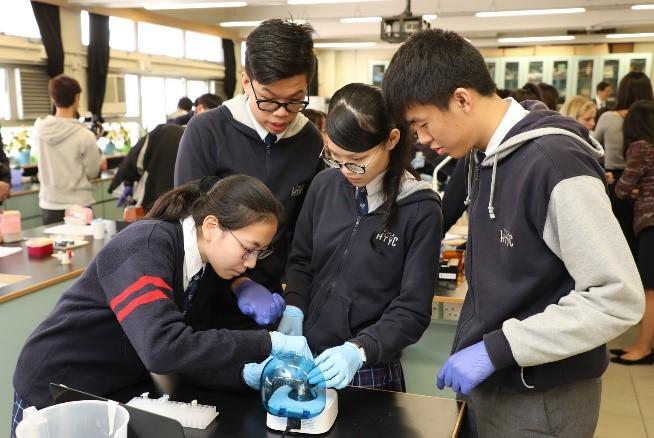Keeping up With Biotech Demand in East Asia: A Conversation With the ABE Hong Kong Team

In Hong Kong and much of the broader East Asia area, the educational system is highly focused on exams. Teachers have their hands full just trying to prepare their students for the intense testing that occurs. Lab time is often reserved only for after school extracurricular activities. But some teachers are still pushing themselves and their students even further, bringing real-world biotech into their labs.
A year into ABE, the Hong Kong site is working hard to meet the huge appetite in secondary schools for biotechnology. “The enthusiasm of the teachers to join ABE is far beyond expectation,” says Dr. Victor Lau Kwok-Chi, the ABE co-site director in Hong Kong. “Teachers are already working very hard on their daily teaching work, so it is so surprising that many teachers are willing to spend two full days on ABE training and enormous time in implementing ABE labs at school afterward.” While time in the lab may not directly boost students’ exam performance, it brings meaning and interest to STEM, he explains, which incentivizes the program for teachers.
Indeed, says ABE Hong Kong Program Coordinator Poh Hiu-Ting, the response to the program is surprising in light of several challenges. “To bring the biotech labs to students, teachers have to rearrange their teaching schedules. They also had to revise the teaching materials into Chinese and share their resources with other ABE teachers,” she says. In addition, the teachers need to find lab technicians to prepare the lessons, most of whom do not have the background to prepare molecular experiments. Luckily, Hiu-Ting says, the lab technicians have been receptive to training: “They are eager to learn about the new technologies and committed to bringing the ABE labs to students with teachers.”
The ultimate goal, the Hong Kong ABE team says, is to harness this early excitement into sustained interest and engagement with biotechnology. “Our goal is to make ABE an integral, sustained part of the secondary biology curriculum in Hong Kong, so that every biology student here will have a taste of authentic biotech labs,” Dr. Lau Kwok-Chi says.
Students in Hong Kong are already reaping the benefits. Dr. Lau Kwok-Chi has loved seeing their reactions when they first observe bacteria glow under UV light. “Students also appreciated very much the ‘seriousness’ of doing ABE lab – wearing gloves, a lab coat, and goggles, and learning aseptic skills and the use of sophisticated equipment, which are all new experiences to them,” he says. “The ABE labs made them feel like a scientist doing real science, and these moments of excitement will help attract them to the field of science in the future.”
The Hong Kong government is now focusing on STEM education, allocating new funds to schools for STEM that have enabled some schools to purchase their own lab equipment. But schools in the region still lack a lot of flexibility in their lab arrangements, and most STEM activities are focused on engineering and IT. “Until now, biotechnology has been an untouched area due to its requirement of sophisticated equipment and expertise,” says Dr. Lau Kwok-Chi. “With ABE, we are successfully making biotechnology an important part of STEM activities at school.”

